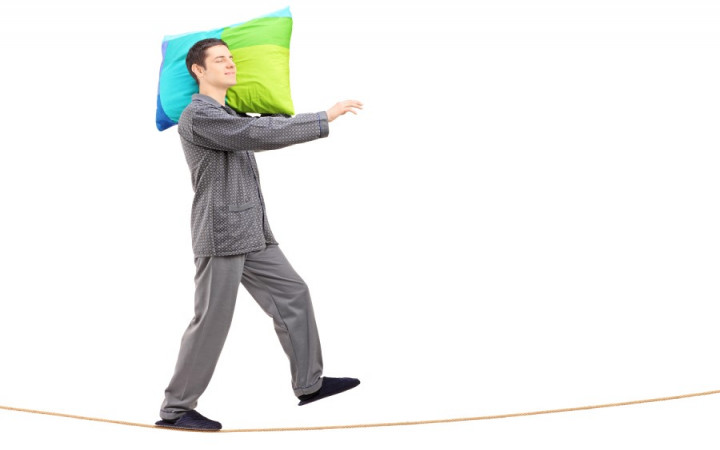Today’s Wonder of the Day was inspired by Kelly. Kelly Wonders, “why do we talk and laugh in our sleep?” Thanks for WONDERing with us, Kelly!
Sleepover! That's the word that excites kids of all ages. The mere mention of a sleepover might conjure up thoughts of movies, popcorn, sleeping bags, and giggles long into the night. In fact, the word sleepover can be a bit deceiving, as there often is less sleeping going on than there usually would be on a regular night.
If you get several kids together for a sleepover, there's a chance you might also encounter some interesting behavior. Once sleep does hit the group, you could wake up in the middle of the night to find a friend talking aloud or walking around a bit like a zombie. Have you ever seen either of these things happen?
Sleepwalking is a phenomenon that can occur in the first few hours after falling asleep. It's in this stage, called slow-wave or deep sleep, when you might find someone walking around, sitting up, or even standing up and acting like she or he is awake.
Although they might be acting like they're awake, they're actually still asleep and probably seem a bit dazed. Sleepwalkers can get up and move around in this state for as little as a few seconds or as long as a half-hour or more. Their eyes may be open, but they're not seeing the world around them in the same way they do when they're awake.
After moving about for a while, most sleepwalkers will return to bed on their own. Most of them won't remember anything about their nighttime adventures in the morning. Scientists estimate that as many as 15% of all kids sleepwalk on a regular basis.
Experts don't know the exact cause of sleepwalking, but studies have shown that the tendency to sleepwalk can run in families, meaning it's likely hereditary. Other experts believe bouts of sleepwalking can be brought on by illnesses, fevers, stress, and lack of sleep.
Sleepwalking usually isn't dangerous, unless a sleepwalker gets injured while sleepwalking. If sleepwalking occurs very frequently, you might need to see a doctor. Although there's no cure for sleepwalking, a doctor can often help pinpoint the cause and recommend steps you can take to minimize episodes.
In the end, most kids simply grow out of their sleepwalking habits. If you happen to wake up and discover someone sleepwalking, just gently steer them back to their bed. Waking them up can cause them to become confused and scared, so avoid startling them if at all possible.
Another interesting sleep behavior you may run across from time to time is somniloquy. That's the scientific word for talking in your sleep. It's a common occurrence that, while odd and sometimes amusing, usually isn't considered a medical problem.
People who talk in their sleep usually only do so for 30 seconds or so at a time. They may have repeated episodes of talking throughout the night, though. What they say can be completely harmless or totally unlike anything they might say while awake. Most people don't remember anything they say while asleep.
Experts report that as many as 50% of kids talk in their sleep up until about age 10. Only about 5% of adults, however, tend to keep chatting in their sleep as they get older. Of those kids and adults who do talk in their sleep, they don't necessarily do it every night. Like sleepwalking, researchers believe somniloquy may run in families.
Scientists don't know for sure why people talk in their sleep. Some people think it must coincide with dreams, but that hasn't proven to be the case. Researchers have found that talking can occur during any stage of sleep. Like sleepwalking, talking during sleep has been linked to illnesses, fever, and stress.
Sleep talking usually doesn't require any kind of treatment. If it becomes a to getting enough sleep, however, you may want to see a doctor to explore options for getting a better night's sleep.




